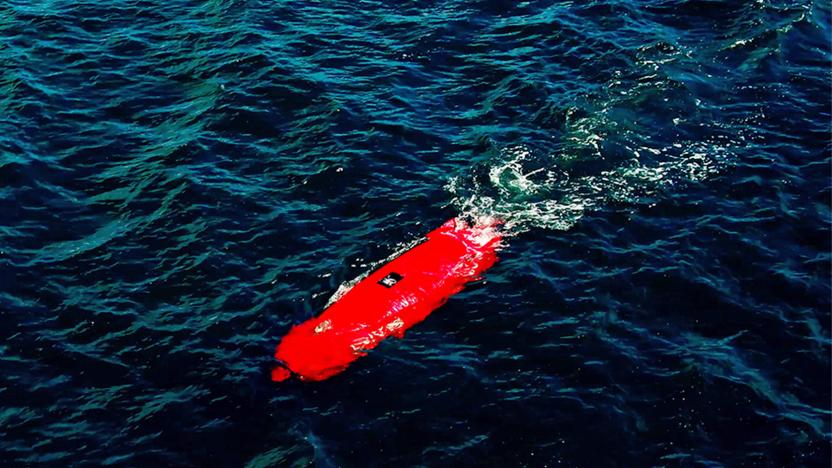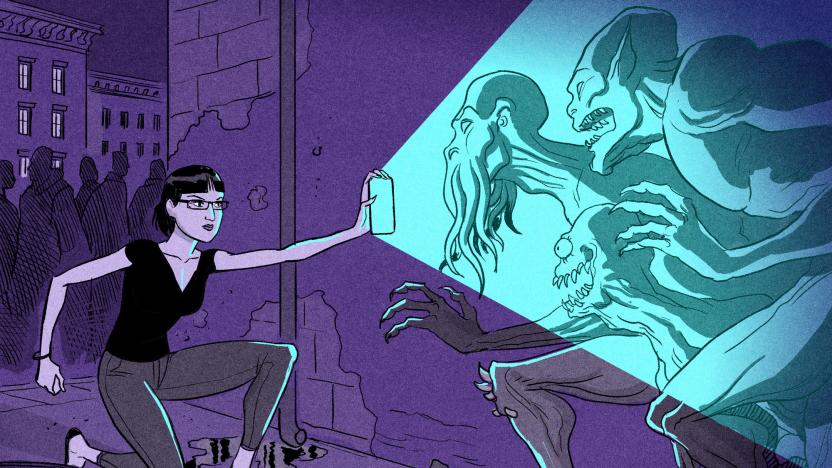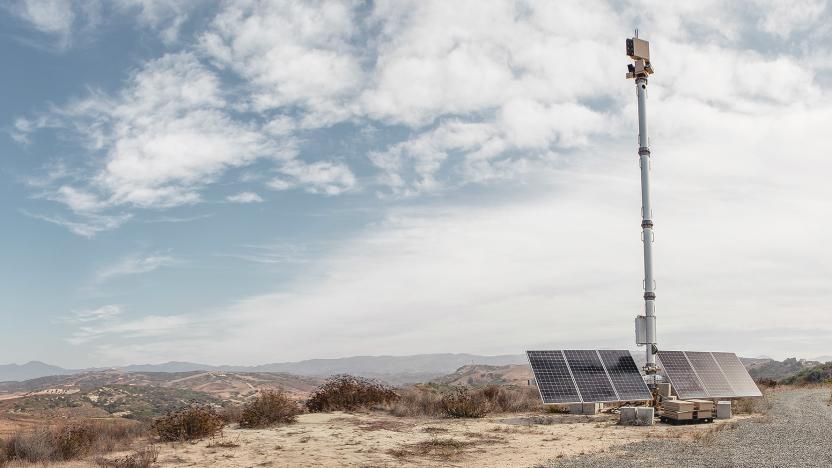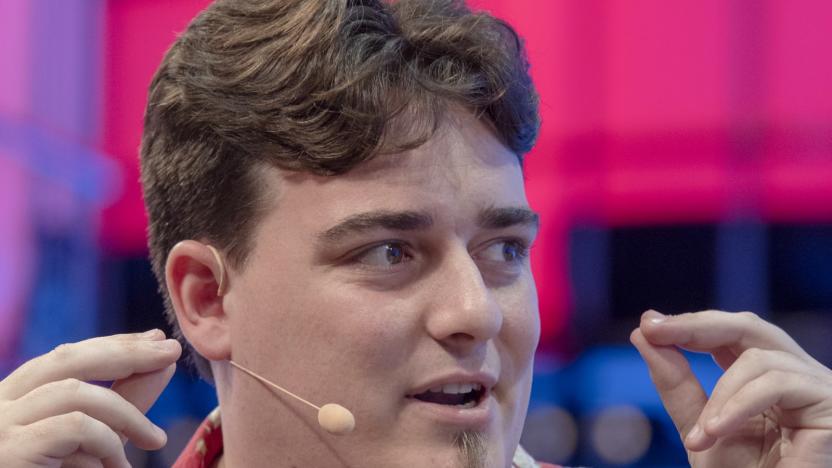Palmer Luckey
Latest

Palmer Luckey's startup bought an underwater drone company
Palmer Luckey's AI defense company Anduril is expanding to underwater drones by acquiring Dive Technologies.

How it feels to survive Silicon Valley and a pandemic
It shouldn’t feel like it took a pandemic to get Twitter to boot 7,000 QAnon accounts (and crack down on 150,000 more related to the violent conspiracy group), but it does. At least Twitter is doing harm mitigation around its role in this interconnected disaster. Five months in, you’d think 145,000 American deaths would move platforms like Facebook, Instagram, and YouTube to ban virus “truther” content, but nah.

Palmer Luckey's startup will build a 'virtual' border wall
It's no secret that Palmer Luckey's Anduril Industries has been developing a "virtual wall" to heighten national security -- he's been at it for the better part of three years. According to a new report from the Washington Post, the Trump administration awarded Anduril a lucrative five-year contract to erect hundreds of AI-powered surveillance towers along the U.S.-Mexico border by 2022. “These towers give agents in the field a significant leg up against the criminal networks that facilitate illegal cross-border activity,” said Border Patrol Chief Rodney Scott in a statement released by U.S. Customs and Border Protection.

Palmer Luckey's company is making drone-ramming drones
Oculus co-founder Palmer Luckey and his company Anduril Industries have drawn flak for their pursuit of controversial government and military contracts, and that uproar isn't about to subside any time soon. Anduril has unveiled the Interceptor, a "counter-drone" built solely to take down other robotic fliers by ramming them at high speed. It requires human operators' permission for takedowns, but can be cued through AI and automatically acquire targets using computer vision. The company is hoping this will protect military units and key infrastructure against hostile drones, whether they're improvised bombers or purpose-built recon vehicles.

Palmer Luckey's firm wins Pentagon drone AI contract
Google may have backed out of the US military's Project Maven, but that doesn't mean other tech companies are unwilling to participate. The Intercept has learned that Oculus Rift co-founder Palmer Luckey's defense company, Anduril, won a contract to support the drone AI initiative in 2018. The firm will also support the Joint Artificial Intelligence Center, according to newly obtained documents. While there aren't specifics around what that contract would entail, Project Maven relies on machine learning to detect people in drone videos and provide more effective intelligence data.

Palmer Luckey donates to software that breaks Oculus exclusivity
Oculus co-founder Palmer Luckey has always railed against the idea of locking VR games to a single platform. Now, several months after leaving Facebook following controversy about his political donations to a pro-Trump group, Luckey is stepping back into the VR world in a surprising way. Waypoint reports that he's contributing $2,000 a month to the Patreon campaign for Revive, a tool that lets HTC Vive owners play games that are only available on the Oculus Rift.

Palmer Luckey looks years out, sees Oculus doing software
Oculus VR founder Palmer Luckey compares the future of virtual reality to the current television industry – the money isn't in manufacturing TVs, it's in creating content for those TVs. "It's going to be the same thing with VR," Luckey said during an interview at Gamescom. "Eventually, it's going to be commoditized and the hardware differences between all the different vendors are going to be meaningless. It's all going to be about the content and the software. So I think we're actually – in the long haul, looking years or decades out – probably more on the software side." Luckey has a clear vision for the final Oculus hardware – higher resolution, higher framerate, 1080p, 90Hz, smaller, lighter and more comfortable. Get all of Luckey's specs in our video interview.

Oculus slams ZeniMax in latest legal statement
The war of words continues between Oculus VR and ZeniMax. The latest salvo comes courtesy of a legal statement issued by the former in which it denies ZeniMax's claim that key tech was developed by John Carmack before he left ZeniMax for Oculus. "By deliberately misstating some facts and omitting others, ZeniMax makes the incredible assertion that it, a videogame software publishing company for personal computers and consoles like the Sony PlayStation, invented and developed a virtual reality hardware and software system," the statement reads, in part. It goes on to state that the Oculus VR headset tech was developed by Palmer Luckey and that the "lawsuit is nothing more than ZeniMax seeking to correct for a massive missed opportunity through the assertion of meritless litigation."

ZeniMax is taking Oculus VR to court
ZeniMax Media and its subsidiary, id Software, filed suit against Oculus VR and the company's founder, Palmer Luckey, claiming that Oculus illegally misappropriated ZeniMax trade secrets and infringed on ZeniMax copyrights and trademarks while developing the Oculus Rift. ZeniMax filed the suit in federal court in the US District Court for the Northern District of Texas. The suit claims that Oculus exploited ZeniMax IP, code and "technical know-how" (that is the technical term) regarding VR technology. ZeniMax said it gave Oculus "valuable intellectual property" under a strict NDA, and that Oculus illegally used its IP to create the Oculus Rift. ZeniMax said it sought compensation from Oculus but was repeatedly denied. In May, The Wall Street Journal reported that ZeniMax asked Oculus for compensation after developer John Carmack left ZeniMax to become Chief Technology Officer at Oculus VR. At the time, ZeniMax said in a statement, "The proprietary technology and know-how Mr. Carmack developed when he was a ZeniMax employee, and used by Oculus, are owned by ZeniMax."

Oculus Rift: From $2.4 million Kickstarter to $2 billion sale
Facebook's acquisition of Oculus VR stunned the game industry. In less than two years, Oculus VR and its Oculus Rift virtual reality headset have gone from (literal) overnight Kickstarter success to subsidiary of a social networking giant. To put it another way: John Carmack, one of the principal creative forces behind the original Doom, is now a Facebook employee. Wild. The transition of Oculus VR from a $2.4 million dollar Kickstarter to a $2 billion dollar acquisition seems unreal. To put things in perspective, and for the benefit of anyone who hasn't kept up with Oculus VR's meteoric rise, we've decided to retrace the company's story all the way from its humble beginnings in 2012.

Oculus founder: Rift is open, Sony's Project Morpheus is not
Oculus VR co-founder Palmer Luckey highlighted the differences between his company's Oculus Rift headset technology and Sony's recently announced Project Morpheus in an interview with GamesBeat, predicting that the majority of Rift software would never see release on Sony's closed platform. "Most developers that are currently making things for the Rift don't really have that same option to make something for Project Morpheus," Luckey told GamesBeat. "We're an open platform that lets anyone develop anything. Sony is not [open]. There are hundreds of experiences already available for the Rift, and I would bet the vast majority of those would not make it onto a PlayStation 4." During the interview, conducted before Facebook revealed its $2 billion purchase of Oculus VR yesterday, Luckey also stated that Project Morpheus is a net positive for the burgeoning industry. "I think it's a good thing for virtual reality when more people come into the market," he said. "Especially a big player. It shows that VR really is something that is gonna have traction." Luckey additionally believes that the VR headset market will be large enough to support both Oculus and Sony. "This market is not even close to saturation, and the Sony thing is just for their console," he said. "Our thing is not on their console, so we don't even cross paths." [Image: Sony]

Oculus founders: Facebook lets us bring the best VR experience to a billion people
Oculus VR co-founders Palmer Luckey and Brendan Iribe had a vision for their company: to bring virtual reality to as many people as possible, in the best way possible, at the lowest possible price. And, according to the duo, selling the company to Facebook is the best way to reach those goals. "This is the best thing for us to do," Luckey told us in a post-announcement interview. "It leaves us in the same position we've always been in, doing the same things we wanted to do."

How to make players sick in your virtual reality game
There is a great, undiscovered potential in virtual reality development. Sure, you can create lifelike virtual worlds, but you can also make players sick. Oculus VR founder Palmer Luckey and VP of product Nate Mitchell hosted a panel at GDC Europe last week, instructing developers on how to avoid the VR development pitfalls that make players uncomfortable. It was a lovely service for VR developers, but we saw a much greater opportunity. Inadvertently, the panel explained how to make players as queasy and uncomfortable as possible. And so, we now present the VR developer's guide to manipulating your players right down to the vestibular level. Just follow these tips and your players will be tossing their cookies in minutes. Note: If you'd rather not make your players horribly ill and angry, just do the opposite of everything below.

Four virtual reality game ideas from the creator of Oculus Rift
According to Oculus VR founder Palmer Luckey (pictured left), there are about 20,000 Oculus Rift developer kits out in the wild. That means there are an awful lot of developers who are certainly hungry for fascinating virtual reality game design concepts. Luckey knows a thing or two about VR, and he was happy to share a few game ideas he's had. "You talk to developers, right?" I told him that I do. "Some ideas. I'm going to give you some ideas. You can give them to whoever you want." So here we go: Four ideas for VR games straight from the man who created the Oculus Rift. If you happen to be a developer, feel free to take one. Oh, and with the exception of Crazy Cops 2, all the title suggestions are mine. Just remember, credit where credit is due.

Oculus founder: booze and Rift don't mix
You know that rule about not drinking and operating heavy machinery at the same time? You can widen that common-sense topic to include not getting tooled up before strapping the Oculus Rift to your face. In conversation with Joystiq, company founder Palmer Luckey has mentioned that the nausea-inducing effects of virtual reality can, unsurprisingly, become magnified if you combine it with the demon drink. Hey, it's something to bear in mind before you lose your lunch.

Live from the Engadget CES Stage: an interview with Oculus's Palmer Luckey and Nate Mitchell (update: speaker change)
Is 2013 the year of the wearable here at CES? It's certainly shaping up to be one of the bigger trends of the show, thanks in no small part to the folks at Oculus. We've already spent some time with the company's Rift prototype this week, and now we'll be joined by Palmer Luckey and Brendan Iribe, the company's co-founder and CEO. Update: In lieu of Brendan Iribe, we'll be speaking to Palmer Luckey and VP Nate Mitchell. January 11, 2013 1:00 PM EST Check out our full CES 2013 stage schedule here!

Oculus Rift will cater to those who wear glasses
Upon first learning about the Oculus Rift virtual reality headset, you may have had one of two reactions. Most of us would look at the promising headset and think, "that looks really promising." Others, however, have only one question: "Will it fit over my glasses?"The short answer is no, it won't. The longer, much more positive answer is that even those with impaired vision will be able to use the Oculus Rift when it's finally available to consumers. While the unit won't fit over eyeglasses – creator Palmer Luckey tells us it would put the headset too far away from the user's face – it will have adjustable optics. Exactly how these will be implemented hasn't been finalized, though two possibilities include binocular-like dial adjustment or special optical inserts. The only impairment that could be problematic, says Palmer, is cases of severe astigmatism, though that may be correctable via software.In other words, years of destroying your eyes by sitting too close to the screen won't stop you from strapping this one directly to your face.










